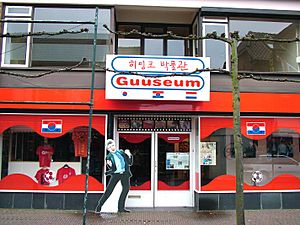Guus Hiddink facts for kids
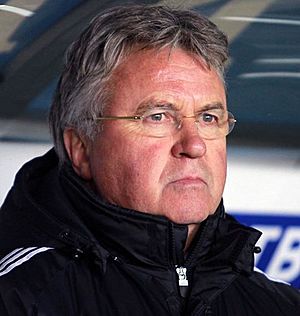
Hiddink in 2012
|
||||||||||||||||
| Personal information | ||||||||||||||||
|---|---|---|---|---|---|---|---|---|---|---|---|---|---|---|---|---|
| Full name | Guus Hiddink | |||||||||||||||
| Date of birth | 8 November 1946 | |||||||||||||||
| Place of birth | Varsseveld, Netherlands | |||||||||||||||
| Position(s) | Midfielder | |||||||||||||||
| Youth career | ||||||||||||||||
| SC Varsseveld | ||||||||||||||||
| Senior career* | ||||||||||||||||
| Years | Team | Apps | (Gls) | |||||||||||||
| 1967–1970 | De Graafschap | |||||||||||||||
| 1970–1972 | PSV Eindhoven | 30 | (1) | |||||||||||||
| 1972–1977 | De Graafschap | 130 | (9) | |||||||||||||
| 1977–1981 | NEC Nijmegen | 104 | (2) | |||||||||||||
| 1978 | → Washington Diplomats (loan) | 13 | (4) | |||||||||||||
| 1980 | → San Jose Earthquakes (loan) | 15 | (0) | |||||||||||||
| 1981–1982 | De Graafschap | 25 | (0) | |||||||||||||
| Total | 317 | (16) | ||||||||||||||
| Managerial career | ||||||||||||||||
| 1983–1987 | PSV (assistant) | |||||||||||||||
| 1987–1990 | PSV | |||||||||||||||
| 1990–1991 | Fenerbahçe | |||||||||||||||
| 1991–1993 | Valencia | |||||||||||||||
| 1994 | Valencia | |||||||||||||||
| 1995–1998 | Netherlands | |||||||||||||||
| 1998–1999 | Real Madrid | |||||||||||||||
| 2000 | Real Betis | |||||||||||||||
| 2001–2002 | South Korea | |||||||||||||||
| 2002–2006 | PSV | |||||||||||||||
| 2005–2006 | Australia | |||||||||||||||
| 2006–2010 | Russia | |||||||||||||||
| 2009 | Chelsea (interim) | |||||||||||||||
| 2010–2011 | Turkey | |||||||||||||||
| 2012–2013 | Anzhi Makhachkala | |||||||||||||||
| 2014–2015 | Netherlands | |||||||||||||||
| 2015–2016 | Chelsea (interim) | |||||||||||||||
| 2018–2019 | China U21 | |||||||||||||||
| 2020–2021 | Curaçao | |||||||||||||||
| 2021–2022 | Curaçao (technical director) | |||||||||||||||
| 2022 | Australia (assistant) | |||||||||||||||
|
Medal record
|
||||||||||||||||
| *Club domestic league appearances and goals | ||||||||||||||||
Guus Hiddink (born 8 November 1946) is a Dutch former football manager and player. He played as a midfielder, which is a player who helps both attack and defend.
After he stopped playing in 1982, Hiddink became a manager. He led many different clubs and national teams around the world to win important titles. For example, he won the European Champions Cup with PSV Eindhoven. He also won the Intercontinental Cup with Real Madrid.
Contents
- Playing Career
- Managerial Career
- Early Club Success
- Leading the Netherlands National Team
- Time with Real Madrid and Real Betis
- South Korea's World Cup Journey
- Return to PSV
- Managing Australia
- Leading Russia
- Interim Manager at Chelsea
- Managing Turkey and Anzhi Makhachkala
- Second Time with the Netherlands National Team
- Second Interim Spell at Chelsea
- China U21 and Curaçao
- Managerial Statistics
- Honours and Awards
- See also
Playing Career
Guus Hiddink was born in Varsseveld, Netherlands. He started playing football in his hometown for an amateur club called SC Varsseveld. In 1967, he became a professional player when he joined the Dutch club De Graafschap.
Hiddink played for De Graafschap under manager Piet de Visser. In 1973, Hiddink and de Visser helped their team get promoted to the Eredivisie. This is the top football league in the Netherlands.
Hiddink spent most of his playing career at De Graafschap. He also played for PSV Eindhoven for a short time in the early 1970s. However, he returned to De Graafschap and played there until he retired in 1982. He was known for playing as a midfielder.
Managerial Career
Early Club Success
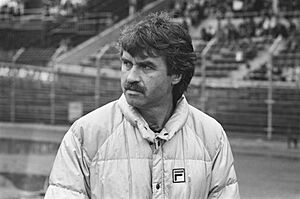
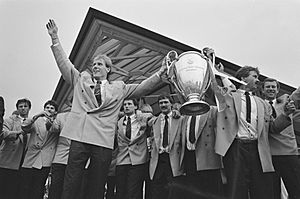
Guus Hiddink started as an assistant manager at PSV Eindhoven in 1983. In March 1987, he became the main manager of the team. PSV was behind Ajax in the league, but Hiddink led them to win the championship that season.
In 1988, Hiddink led PSV to win their first ever European Cup. This is a very important trophy for European clubs. They also won the Dutch league and cup that year, completing a historic "Treble." This means winning three major trophies in one season.
Overall, Hiddink's PSV team won three Dutch league titles in a row. They also won three Dutch Cups in a row and the European Cup in the 1987–88 season. After leaving PSV, Hiddink also managed Fenerbahçe in Turkey and Valencia in Spain.
Leading the Netherlands National Team
On 1 January 1995, Hiddink took on a big challenge. He became the manager of the Netherlands national team. This team had many talented players but often had disagreements. Hiddink took a strong approach to manage the team.
At UEFA Euro 1996, the team reached the quarter-finals. Hiddink even sent one player home after an argument. In the 1998 FIFA World Cup, his team played exciting football. They beat Argentina 2–1 in the quarter-finals. However, they lost to Brazil in the semi-finals after a penalty shootout. The Netherlands finished fourth in the tournament. After this, Hiddink left the national team.
Time with Real Madrid and Real Betis
In 1998, Hiddink became the manager of the Spanish club Real Madrid. With Real Madrid, he won the Intercontinental Cup in 1998. This is a competition between the best club teams from different continents. He left Real Madrid in February 1999.
In 2000, Hiddink managed another Spanish club, Real Betis, for a short time.
South Korea's World Cup Journey
In January 2001, Guus Hiddink became the manager of the South Korea national team. South Korea had played in five World Cups before but had never won a match. They were co-hosting the 2002 FIFA World Cup with Japan.
Hiddink focused on making the players very fit for the World Cup. At the tournament, his team made history. They won their first ever World Cup match, beating Poland 2–0. After a draw with the U.S. and a win against Portugal, South Korea moved to the second round.
They then beat Italy 2–1 with a "golden goal." This was a huge upset! The Korean public started to dream big. They then beat Spain in the quarter-finals after a penalty shootout. This meant South Korea reached the semi-finals, which was an amazing achievement.
South Korea's incredible journey ended when they lost 1–0 to Germany in the semi-finals. They finished fourth after losing to Turkey in the third-place match.
Because of this success, Hiddink became a hero in South Korea. He was given honorary South Korean citizenship. The Gwangju World Cup Stadium was even renamed Guus Hiddink Stadium in his honor. In his hometown of Varsseveld, a museum called the Guuseum was set up by his family.
Return to PSV
After the 2002 World Cup, Hiddink returned to manage PSV Eindhoven in the Netherlands. During this second time with PSV, he won three more Dutch league titles (in 2003, 2005, and 2006). He also won the Dutch Cup in 2005 and the Dutch Super Cup in 2003.
In the 2004–05 Champions League, PSV reached the semi-finals. They narrowly lost to Milan. This period made Hiddink the most successful Dutch coach ever. He won six Dutch League titles and four Dutch Cups in total. He left PSV in June 2006.
Managing Australia
On 22 July 2005, Hiddink also became the manager of the Australia national team. He managed both PSV and Australia at the same time.
Hiddink led Australia to qualify for the 2006 FIFA World Cup. This was the first time Australia had reached the World Cup finals in 32 years! He was very popular in Australia and was often called "Aussie Guus."
At the 2006 World Cup, Australia beat Japan 3–1 in their first game. They then lost to Brazil. In their last group match, they drew 2–2 with Croatia. This draw was enough for Australia to reach the knockout stages for the first time in their history.
In the second round, Australia lost 1–0 to Italy in a very close and controversial match. This meant Australia was out of the World Cup, and Hiddink's time as Australia's coach ended.
Leading Russia
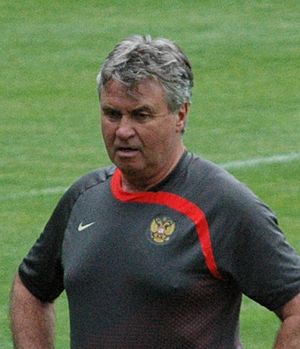
On 10 April 2006, Hiddink announced he would become the manager of the Russia national team. He started this job after the 2006 World Cup.
Hiddink helped Russia qualify for UEFA Euro 2008. At the tournament, Russia played very well. They reached the semi-finals, beating the Netherlands in the quarter-finals. However, they lost in the semi-finals. In November 2009, Russia lost a play-off match for the 2010 World Cup, so they did not qualify. Hiddink left the Russian team in June 2010.
Interim Manager at Chelsea
On 11 February 2009, Hiddink became the interim (temporary) manager of Chelsea in England. He continued to manage Russia at the same time. His first game with Chelsea was a 1–0 win against Aston Villa.
Hiddink helped Chelsea reach the semi-finals of the Champions League. They were knocked out by Barcelona on the away goals rule. He only lost one league game during his time at Chelsea.
In his last game as Chelsea's interim coach, he won the 2009 FA Cup by beating Everton 2–1 at Wembley. He was very happy to win this trophy. Even though players wanted him to stay, Hiddink returned to his job with the Russian team.
Managing Turkey and Anzhi Makhachkala
On 16 February 2010, Hiddink agreed to coach the Turkey national team. His contract started on 1 August 2010. Turkey defeated Romania 2–0 in a friendly match. Hiddink resigned after Turkey failed to qualify for UEFA Euro 2012.
On 17 February 2012, Hiddink became the manager of the Russian club Anzhi Makhachkala. In his second season, he led the team to a bronze medal in the Russian Premier League. They also reached the round of 16 in the UEFA Europa League. He left Anzhi Makhachkala in July 2013.
Second Time with the Netherlands National Team
On 28 March 2014, it was announced that Hiddink would return to manage the Dutch national team after the 2014 FIFA World Cup. He agreed to manage the team until UEFA Euro 2016. His second time in charge started with a 2–0 loss to Italy. The Dutch team struggled in their Euro 2016 qualifying matches. Hiddink left his position on 29 June 2015.
Second Interim Spell at Chelsea
On 19 December 2015, Hiddink was appointed interim manager of Chelsea again. He took over after the previous manager was dismissed. Hiddink said he was "excited to return to Stamford Bridge."
Chelsea ended the 2015–16 Premier League season in tenth place. They had climbed six positions from 16th place when Hiddink arrived.
China U21 and Curaçao
On 10 September 2018, Hiddink took over the China under-21 national team. He was fired in September 2019 after some disappointing results.
On 21 August 2020, Hiddink was appointed manager of the Curaçao national team. He aimed to lead them to the 2022 FIFA World Cup qualification. However, he got sick with COVID-19 in 2021. On 9 September 2021, Hiddink officially stepped down as head coach of Curaçao. He announced his retirement from managing at the age of 74.
In September 2022, Hiddink briefly came out of retirement to help the Australia national team as an assistant coach for two friendly matches. This was part of Australia's 100-year football celebrations.
Managerial Statistics
| Team | From | To | Record | ||||||||
|---|---|---|---|---|---|---|---|---|---|---|---|
| Games | Wins | Draws | Losses | Goals For | Goals Against | Goal Difference | Win % | Source | |||
| PSV Eindhoven | 16 March 1987 | 30 June 1990 | 153 | 104 | 28 | 21 | 401 | 137 | +264 | 67.97 | |
| Fenerbahçe | 1 July 1990 | 13 March 1991 | 29 | 13 | 7 | 9 | 54 | 51 | +3 | 44.83 | |
| Valencia | 1 July 1991 | 30 November 1993 | 112 | 56 | 26 | 30 | 189 | 121 | +68 | 50.00 | |
| Valencia | 26 March 1994 | 30 June 1994 | 8 | 3 | 3 | 2 | 16 | 8 | +8 | 37.50 | |
| Netherlands | 1 January 1995 | 12 July 1998 | 39 | 22 | 8 | 9 | 82 | 31 | +51 | 56.41 | |
| Real Madrid | 10 July 1998 | 24 February 1999 | 34 | 20 | 4 | 10 | 74 | 47 | +27 | 58.82 | |
| Real Betis | 1 February 2000 | 31 May 2000 | 16 | 3 | 6 | 7 | 13 | 22 | −9 | 18.75 | |
| South Korea | 1 January 2001 | 8 July 2002 | 38 | 14 | 13 | 11 | 45 | 43 | +2 | 36.84 | |
| PSV Eindhoven | 1 August 2002 | 30 June 2006 | 192 | 128 | 35 | 29 | 423 | 153 | +270 | 66.67 | |
| Australia | 22 July 2005 | 9 July 2006 | 13 | 8 | 2 | 3 | 28 | 11 | +17 | 61.54 | |
| Russia | 10 July 2006 | 30 June 2010 | 39 | 22 | 7 | 10 | 66 | 34 | +32 | 56.41 | |
| Chelsea | 16 February 2009 | 31 May 2009 | 22 | 16 | 5 | 1 | 41 | 19 | +22 | 72.73 | |
| Turkey | 1 August 2010 | 16 November 2011 | 16 | 7 | 4 | 5 | 18 | 15 | +3 | 43.75 | |
| Anzhi Makhachkala | 17 February 2012 | 22 July 2013 | 62 | 33 | 15 | 14 | 89 | 52 | +37 | 53.23 | |
| Netherlands | 1 August 2014 | 30 June 2015 | 10 | 4 | 1 | 5 | 20 | 15 | +5 | 40.00 | |
| Chelsea | 19 December 2015 | 15 May 2016 | 27 | 10 | 11 | 6 | 53 | 34 | +19 | 37.04 | |
| China U21/U23 | 10 September 2018 | 20 September 2019 | 6 | 3 | 3 | 0 | 18 | 4 | +14 | 50.00 | |
| Curaçao | 22 August 2020 | 9 September 2021 | 6 | 3 | 2 | 1 | 15 | 3 | +12 | 50.00 | |
| Total | 822 | 469 | 180 | 173 | 1,645 | 800 | +845 | 57.06 | |||
Honours and Awards
As a Player
De Graafschap
- Tweede Divisie: 1969
San Jose Earthquakes
- North American Soccer League Southern Division: runner-up 1977
As a Manager
PSV Eindhoven
- Eredivisie (Dutch League): 1987, 1988, 1989, 2003, 2005, 2006
- KNVB Cup (Dutch Cup): 1988, 1989, 1990, 2005
- Johan Cruijff Schaal (Dutch Super Cup): 2003
- European Cup: 1988
Netherlands National Team
- FIFA World Cup Fourth place: 1998
Real Madrid
- Intercontinental Cup: 1998
South Korea National Team
- FIFA World Cup Fourth place: 2002
Russia National Team
- UEFA European Championship Third place: 2008
Chelsea
- FA Cup: 2009
Individual Awards
- AFC Coach of the Year: 2002
- World Soccer World Manager of the Year: 2002
- Dutch Sports Coach of the Year: 2002, 2005
- Rinus Michels Award: 2005, 2006
- Coach of the Year in Russia: 2008
- Honorary doctorate by the University of Seoul
- The De Graafschap mascot is named Guus in his honor.
- The Gwangju World Cup Stadium was renamed the Guus Hiddink Stadium in his honor.
- Named an Honorary Citizen of South Korea and Seoul after the 2002 FIFA World Cup.
- Named an honorary citizen of Eindhoven in 2006.
- Featured on a stamp by Australia Post after the 2006 FIFA World Cup.
- Received a lifetime achievement award from the Royal Dutch Football Association in 2007.
See also
 In Spanish: Guus Hiddink para niños
In Spanish: Guus Hiddink para niños
- List of FA Cup winning managers
 | Audre Lorde |
 | John Berry Meachum |
 | Ferdinand Lee Barnett |


